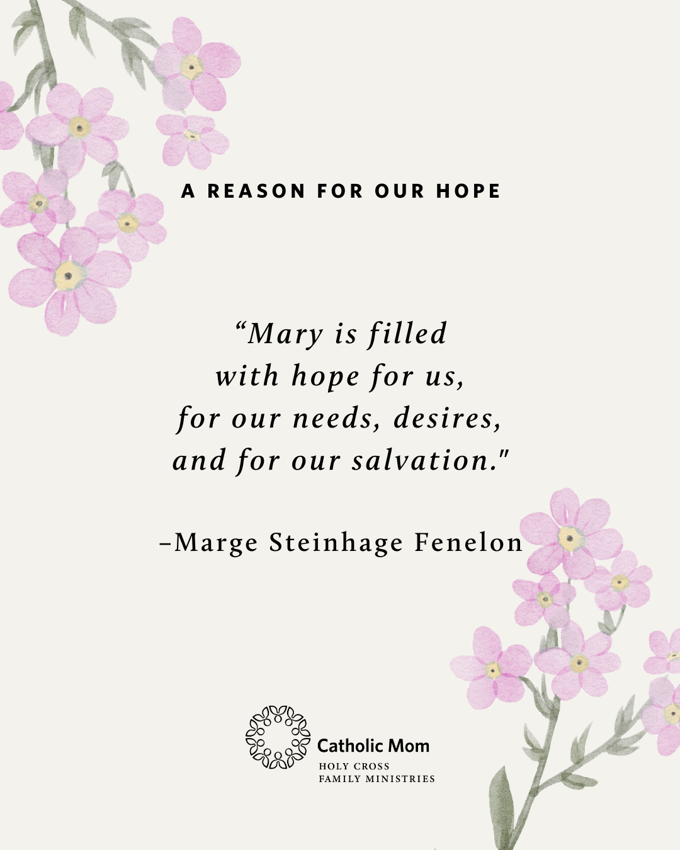One of my favorite scenes involving our Blessed Mother is the Wedding at Cana. Some Scripture scholars like to point to its significance because it marks Jesus’ first public miracle. Others think that its main intent was to draw attention to the validity and dignity of marriage.
Mariologists sometimes look at it as exemplifying the fact that Jesus and Mary were, like us, human beings with family ties and important life events. All of these are true, and I appreciate each perspective. But I have one of my own.
Mary Is Attentive to Others' Needs
When I contemplate the Cana event, I am drawn to Mary’s attentiveness. While the other wedding guests are celebrating, she notices that something is amiss. The wedding couple has run out of wine, which, in that time and culture, would have been a huge embarrassment. First-century Jewish weddings were major occasions. Not only the family and relatives, but often the entire town was invited. Additionally, the feasting went on for days as opposed to the way modern weddings are conducted, with a single afternoon or evening reception. It was the responsibility of the wedding couple and their parents to keep everyone happy and satiated with food and drink.
Amid the revelry, Mary’s focus was not on celebrating but on the feelings and needs of the bride and groom. They faced embarrassment and perhaps even shame. This was a monumental moment in their lives, and Mary did not want to see it marred. And so, in her quiet, subtle way, she took action to remedy the situation. There was nothing she could do of her own accord, but she knew Someone who could help the couple.
She approached her Son and said four simple words: “They have no wine.” Mary did not know for certain that Jesus would perform a miracle, but she had certain hope that he would. That is because our Blessed Mother is a woman of profound hope.
We know the rest of the story. Jesus gave his mother a little pushback, but Mary did not lose hope. Instead, she merely told the servants, “Do whatever he tells you.” Then she waited in patient hope for our Lord to take the next step. Then He not only fulfilled Mary’s hope, but He did so in an exquisite way. The wine He produced from the water was not just any wine; it was exceptionally good. So much so that the guests remarked about its quality, assuming that the wedding couple had withheld the best wine for the last.
Mary's Words Became My Go-To Prayer
Mary’s words, “They have no wine,” have made a deep impression on me. It has become my go-to prayer in every need. When times were tough for our family and we had trouble making ends meet, I prayed, “Mother, we have no wine.” When I was completely exhausted, confused, or afraid, I would tell her, “Mother, I have no wine.” In every crisis our family has ever faced, I turn to Mary and remind her, “Mother, we have no wine.” It has become automatic for me.
I use my go-to prayer for others as well when I notice their needs. When a friend loses a loved one, has an urgent need, or receives a serious diagnosis, I utter, “Mother, they have no wine.” It is the same for natural disasters, persecution, war, and violence. In every such situation, I go before our Blessed Mother to present the petition to her and ask her to urge her Son to change the water into wine. Then I ask her to help me to have the same certain hope that she had at the Wedding at Cana.

Together, we wait in hope for our Lord to act in his own way. He will change the water into wine in a manner that will be beyond our expectations. It may not always be the exact kind of wine we anticipated, but it will be a wine that will be exceptionally good because it is in accord with the will of the heavenly Father.
In this Jubilee Year of Hope, we would do well to contemplate the Wedding at Cana daily. Just as Mary observed the needs of the wedding couple, she observes our needs. Just as she was moved to compassion for their sake, she is moved to compassion for ours. She is filled with hope for us, for our needs, desires, and for our salvation. When our wine jugs are empty, she turns to Jesus and tells him, “They have no wine.”
For the Jubilee of Hope, our writers reflect on prayer as a source of hope in their lives.
Copyright 2025 Marge Steinhage Fenelon
Images: Holy Cross Family Ministries